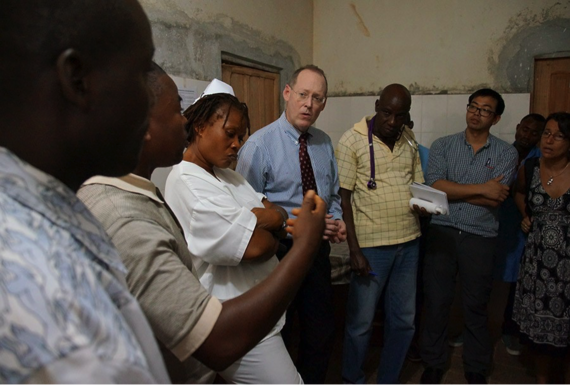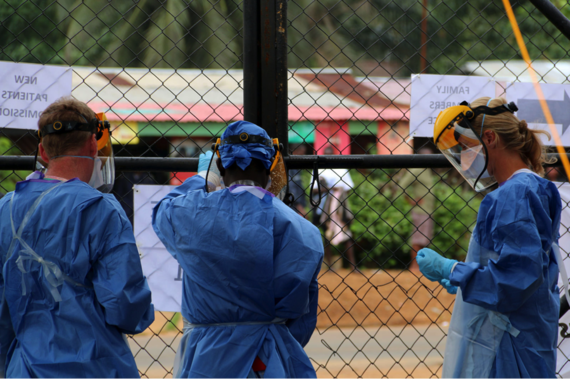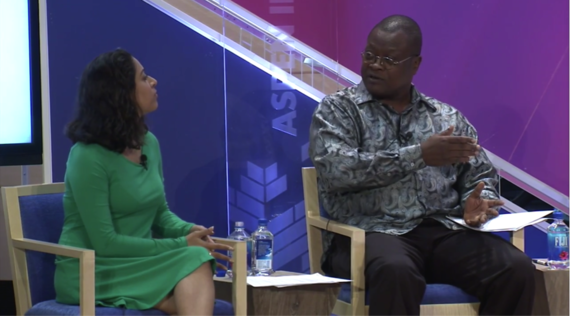
We're over 20 months into the Ebola epidemic, and while it has slowed over the last few months, new cases continue to emerge each week. Liberia, declared Ebola-free for over two months, suffered another death from the disease last month, spreading fears of a comeback in the country.
However, despite the over 27,000 cases and 11,000 deaths as of early August -- both numbers of which are assumed to be vastly under-representative of true figures -- we were lucky that this tragedy was just Ebola. It could've been, and can be, much worse.
Ron Klain, who served as the White House Ebola response coordinator until February, outlined why in the New York Times this past February.
"As bad as this epidemic has been, it could pale in comparison to greater threats in the future. Ebola is hard to transmit, has telltale symptoms before patients are highly contagious, and has not exploded in poverty-stricken global megacities. What will happen when we face an inevitable global pandemic that is more easily transmitted, less easy to detect, and rampant in the world's most densely-populated areas?"
Both measles and influenza spread much faster than Ebola. In the remote rural villages of central Africa, where Ebola first appeared in the 1970s, the sick were easy to quarantine and the virus burnt itself out. By the time people became contagious, they had been isolated and bedridden for days. In 2014, a lack of familiarity or preparedness, combined with porous borders, led the disease to rapidly move inwards from remote areas to major cities of Guinea, Sierra Leone, and Liberia. Yet, other than a handful of cases, the disease has still remained isolated to West Africa.
At TED 2015 in March, Bill Gates made it clear that next time, we might not be so lucky. "If anything kills over 10 million people in the next few decades, it's most likely to be a highly infectious virus." Just one month later, he wrote in the New England Journal of Medicine: "Even if the system we have today had worked perfectly for Ebola, it would fail to contain a more infectious disease." In fact, a simulation Gates ran at TED of the 1918 Spanish influenza virus showed that today, a quickly spreading airborne virus would kill over 30 million people in less than nine months. The World Bank estimates that a global influenza pandemic of that caliber would cause $3 trillion in economics losses.
The fragility of health systems in West Africa explains why this outbreak has been so deadly compared to those in the past.
Texas Health Presbyterian Hospital in Dallas, where the first patient infected with Ebola in the U.S. was treated, alone currently employs 1,427 physicians, over seven times the number of doctors in Sierra Leone and Liberia combined, to treat one-tenth the number of people. Raj Panjabi, Founder of Last Mile Health, put that disparity into context at this year's Harvard Medical School and Harvard School of Dental Medicine Class Day. "The [civil] war had left Liberia with just 51 doctors to serve a country of 4 million people, which would be like all of Boston having roughly eight doctors."
Chances are, unless you were lucky enough to live near one of those few doctors after falling sick, your chances of survival in Liberia or other West African countries were slim. Non-profit organizations like Last Mile Health, the Gates Foundation, and Médecins Sans Frontières, as well as the U.S. Centers for Disease Control and Prevention, have been working to close this treatment gap by training frontline health workers to prevent the spread of Ebola and other infectious diseases. But in remote areas, where there is no running water, cell phone service, or paved roads, and only a shell of a health system in place, if anything at all, there is often no one to contain and treat, let alone identify, sick patients before the disease spreads.
Samuel Kargbo, the director of health systems, policy, planning, and information for Sierra Leone's Ministry of Health and Sanitation, noted the lack of training and experience local health workers had in dealing with a disease like Ebola at the Aspen Ideas Festival in June. "When it happened...our staff were not really ready for something like this. It was the first time we had this type of disease around that area. Because it was the very first time, nobody knew what to do, so they had to refer them to the general hospital, which was wrong A field hospital should have been done in the forest to treat them, but we brought them into the urban areas and this is what caused this all - rapid spread within the urban areas.
The health worker's unfamiliarity with Ebola led to their own vulnerability to the disease. Some contaminated their hands while trying to take off the protective suit health workers donned while caring for patients. Others wore the suit incorrectly altogether. A few were accidentally stuck with needles that had been used to give intravenous fluids to Ebola patients. For an illness that required constant attention, support, and safety to contain, the difficulty of keeping health systems in West Africa up and running alone made it difficult to avoid making mistakes. The Economist reports that as of July 5th, 875 medical staff in the three West African countries had been infected with Ebola, 509 of them, nearly 60%, had died.
The Ebola crisis seems to have left us with more questions than answers. How can we use what we've learned from our successes and mistakes throughout the Ebola crisis to prepare for the next epidemic? What will have to be different next time? How long do we have to prepare? How can we keep our heroic health workers, the ones who truly prevented the virus from spreading, safe from harm?
While we have the capability, training, and technology to respond to infectious disease outbreaks, the resources haven't been in the places that need them the most. Overcoming geographical boundaries, cultural barriers, and a lack of medical training programs, health workers, equipment, infrastructure, and funding make global health interventions as much of a logistics concern as a medical one.
Global health leaders do, however, have ideas, which, in combination, may provide a foundational framework for tackling future-inevitable-public health crises.
Gates, who's Foundation has already been working since 2000 to eradicate polio, malaria, and tuberculosis, outlined four objectives to improve global health interventions and responses: 1) strengthen local health systems, 2) create a medical reserve core with military-grade operation capabilities, 3) run "germ game" simulations analogous to those done by the military in order to discover and fix gaps in aid delivery, and 4) increase funding for research and development in infectious disease diagnostics and vaccines before they emerge as epidemics.
First and foremost, developing public sector healthcare infrastructure is the only way to scale health programs and confer the right to health to civilians abroad. Instead of investing in local infrastructure and training, many NGOs have arrived during the time of crisis, completed their work, and left, leaving local systems helpless on their own against future outbreaks. Building prepared public health systems, with trained, local health workers who understand the region, language, and culture, equipped with treatment protocols suited to the needs and capability of each area, is the foundation for a sustainable future of global health equity. Klain agrees with Gates. "If you just treat it [global health] as crisis response, you are always going to be behind, you are always going to be catching up, and the only way to stop that, reverse that trend, is to get ahead of it by investing in national healthcare systems." NGOs, well intentioned as they may be, do not have the ability to give citizens a right to health, to clean water, or secure borders. That can only be promised and delivered by local governments.
At the 2008 Skoll World Forum at Oxford, Paul Farmer, co-founder of Partners in Health and University Professor at Harvard Medical School, wincefully said "we live in an era in which simply seeking to provide high-quality medical care to the world's poorest is considered innovative and entrepreneurial."
 Dr. Paul Farmer and members of the PIH Advance Ebola Response Team meet with Liberian health care workers at the Martha Tubman Memorial Hospital in Zwedru, Liberia.
Dr. Paul Farmer and members of the PIH Advance Ebola Response Team meet with Liberian health care workers at the Martha Tubman Memorial Hospital in Zwedru, Liberia.
Kargbo, who firsthand understands the plight of under-equipped health systems, is worried about maintaining global support for public health systems beyond the time of international crisis. "When the attention of the press goes away, the funds go away." Kargbo believes that without investment in local health systems, training, roads, airports, and telecommunications, public health deserts like West Africa will remain as such.
Despite the ongoing number of cases, media coverage of the epidemic has been steadily declining since mid-October of last year and, since March, has flat-lined. In fact, coverage reached its peak only after the first case of Ebola hit the United States. But diseases don't see borders. A quick and effective response requires funding, resources, and effort from everyone, everywhere. What happens in a remote forest region in West Africa can be on our doorstep before we know it," Klain said. An investment in public health anywhere is an investment in the future of humanity.
Klain, who has also been critical of the World Health Organization's delayed response to the Ebola crisis, believes we need an entirely new international health organization, either a permanently-standing or ready reserve "white-hat battalion", comprised of rapid-response public health emergency responders with military-grade logistics. Unpaved roads are no longer a limiting factor when health workers can, within hours, parachute into affected areas and airlift medical supplies. He believes this could be accomplished by United States and European Union medical and military forces.
Kargbo believes we need both, a concerted effort between local health systems and international health organizations, in addition to increased infectious disease research. This way, he hopes, the next time disaster strikes, responders will be prepared to treat patients and spread a message of hope instead of running clinical trials that should have been completed a decade ago.


